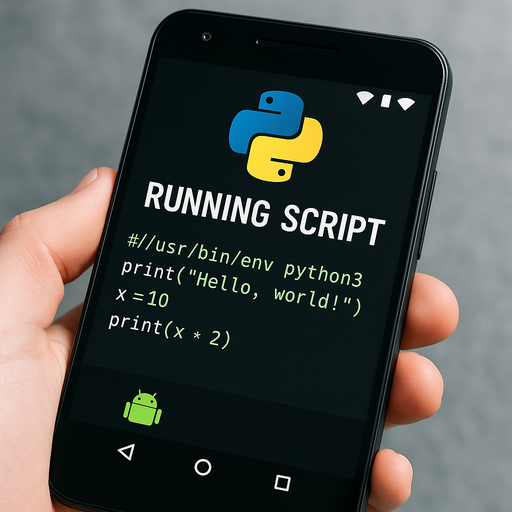Modern smartphones are becoming increasingly powerful, allowing you to run even serious programming languages. Learn how to execute Python scripts on Android devices and which IDEs offer the best functionality for mobile development.

G. Ostrov
Python on Android: Possibilities and Limitations
Python developers and enthusiasts have long dreamed of being able to program directly on mobile devices. Today, this has become a reality thanks to several specialized applications available in the Google Play Store.
Running Python scripts on Android has several advantages:
- The ability to program anywhere and anytime
- Using smartphone sensors in your projects
- Automating tasks on your mobile device
- Learning programming without needing a computer

Top 5 IDEs for Python on Android
1. Pydroid 3
Pydroid 3 is the most popular and functional IDE for Python on Android. The app includes a Python 3 interpreter, supports libraries through pip, and offers code autocompletion.
Key features:
- Built-in terminal for executing commands
- Syntax highlighting
- Offline Python documentation
- Support for NumPy, SciPy, matplotlib, and other libraries
2. QPython
QPython is a powerful alternative with its own ecosystem. The app offers two separate products: one for Python 2.x and another for Python 3.x.
Advantages:
- Interactive console
- Built-in editor with syntax highlighting
- QR code for quick script execution
- Its own program repository QPYPI
3. Termux + Python
Termux is not just an IDE but a full-fledged Linux environment for Android. When you install Python through Termux, you get an experience close to developing on a desktop computer.
Capabilities:
- Full access to the Linux command line
- Installing any packages via apt
- Integration with external editors
- Ability to run web servers and other services
4. PyDroid IDE
PyDroid IDE is positioned as a lightweight alternative for beginner programmers and educational purposes.
Features:
- Intuitive interface
- Quick library installation
- Built-in learning materials
- Low system requirements
5. Code Editor
Although not a specialized Python IDE, Code Editor supports many languages including Python, and offers rich functionality for code editing.
Advantages:
- Support for multiple programming languages
- Dark theme and customizable syntax highlighting
- Working with projects and FTP client
- Built-in debugger
Practical Guide: Running Your First Script
To get started with Python on Android, we recommend the following steps:
- Install an IDE: Download and install Pydroid 3 from the Google Play Store
- First script: Create a new file and write simple code (e.g., print("Hello from Android!"))
- Run the code: Press the play button to execute the script
- Install libraries: Use the built-in package manager to add necessary modules
Limitations of Python on Android
Despite the wide possibilities, development on a mobile device has some limitations:
- Lower performance compared to desktop computers
- Limited support for some libraries
- Inconvenience of typing code on a virtual keyboard
- Potential issues with access to the file system
Conclusion
Python on Android opens new possibilities for mobile programming. While this environment cannot replace full-fledged development on a computer, it is ideal for learning, quick prototyping, and implementing small projects on the go.
The choice of a specific IDE depends on your needs: Pydroid 3 and QPython offer the most complete functionality, Termux provides maximum flexibility, and PyDroid IDE is excellent for beginners.
Useful links:




